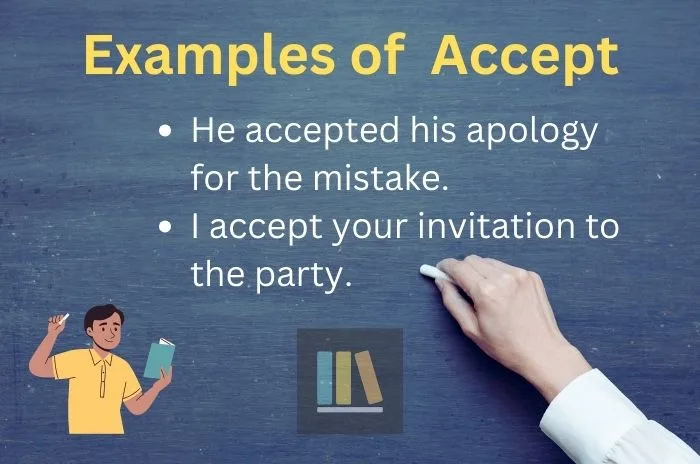Discover the key differences between Accept Vs Except in this informative blog post. Learn the ins and outs of these often confused words and enhance your writing skills. Know when to use “accept” to indicate approval or agreement and when to use “except” to indicate exclusion. Our comprehensive guide will help you avoid common grammar errors and raise your communication game. Whether you are a writer, student, or professional, mastering these two words will undoubtedly increase your language proficiency.
Accept Vs Except | Except Vs Accept
Two commonly confused words that often find themselves at the center of a linguistic mix-up are “accept” and “except”.
“Accept” is a verb that signifies receiving, agreeing, or accepting something. It refers to the positive action of adopting something, be it an idea, a gift, or an offer.
For example, you might accept an invitation to a party or accept a new job offer.
On the other hand, “except” is a preposition or conjunction that indicates an exclusion or exception to a rule. It is used when you want to exclude something or someone from a group or statement.
For example, “Everyone is coming to the meeting except Sarah,”
Understanding the variation between “accept” and “except” is important for effective communication. Using them correctly not only enhances your writing but also ensures that your message is clear and accurate. So, remember to accept new knowledge and use it wisely, as well as keep exceptions in mind to avoid common language difficulties.
Except Definition | What Does Except Mean?
The word “except” is commonly used in English as a preposition or conjunction to introduce an exclusion or exception. It is used to indicate that something is not included in a particular statement, list, or group of items. Except is a verb in its own right. It has the meaning of “to leave out or exclude (someone or something).”
As a preposition, “except” means excluding or excluding the mentioned item. Here are some examples of “except” used as a preposition:
- I invited everyone to the party except John.
- All the ingredients for the recipe are in the pantry except for the sugar.
- The store is open every day except Sundays.
In these sentences, “except” is functioning as a preposition because it shows the relationship between the noun that follows it and the rest of the sentence.
However, “except” is more commonly used as a conjunction to introduce a clause that contrasts with the main clause:
- I would go to the beach, except it’s raining.
- We’ll go to the movie tonight, except if something urgent comes up.
- I like all fruits except for durian.
In these sentences, “except” is not a preposition but a conjunction because it connects two clauses or phrases and indicates a contrast or exception.
“Except” is a term used to specify an exclusion or exception within a statement or group. It indicates that something is not included or does not apply in the context described.

Except Synonym
Except is a word that is commonly used in everyday English and has many synonyms that can be used in its place. Some of the most commonly used synonyms for except:
- Exclude
- Omit
- Leave out
- Bar
- Exempt
- Save
- Apart from
- Aside from
- Other than
- But
- Excluding
- Not including
- With the exception of
- Besides
- Excluding
Please note that the suitability of these synonyms may vary depending on the context in which you want to use them.
Define Accept
The word “accept” is a verb that means to receive or take something voluntarily, with approval, or without protest. It implies a willingness to adopt or agree to something, whether it is an idea, proposal, proposal, or invitation. When you accept something, you accept it and agree to its terms or conditions.
For example:
- She accepted the job offer and will start work next week.
- He accepted his apology for the mistake.
- The school accepts students from a variety of backgrounds.
- I accept your invitation to the party.

In these examples, “accept” signifies a positive response or agreement to various situations. It is the opposite of rejecting or rejecting something.
Accept Synonym
Here are some synonyms for the word “accept”:
- Receive
- Embrace
- Welcome
- Adopt
- Acknowledge
- Consent
- Agree to
- Assent to
- Approve
- Admit
These synonyms can be used interchangeably in various contexts depending on the nuance you want to convey.
Read Also: Have You Ate or Eaten? The Grammar Mystery 2023
FAQ
How do you use Accept Vs Except?
“Except” is used to exclude something or indicate an exception.
“Accept” is used to agree to or receive something.
Is it accept me or except me?
Accept me.
What is an example of except?
“Except” can be used to indicate exclusion or contrast. For example, “I like all fruits except bananas.”
What is an example of accept?
Accepting a gift graciously.
What is the synonym of except?
There are several synonyms for the word “except,” including:
Exclude
Omit
Leave out
Exempt
Aside from
Other than
But
Save
Unless
Conclusion
In conclusion, understanding the difference between Accept Vs Except is crucial for clear communication in both written and spoken language. “Accept” denotes approval or agreement, while “except” is used to exclude or make exceptions. Employing these terms, Accept Vs Except correctly enhances the precision of your message, contributing to effective communication and, ultimately, improving the overall quality of your content.
